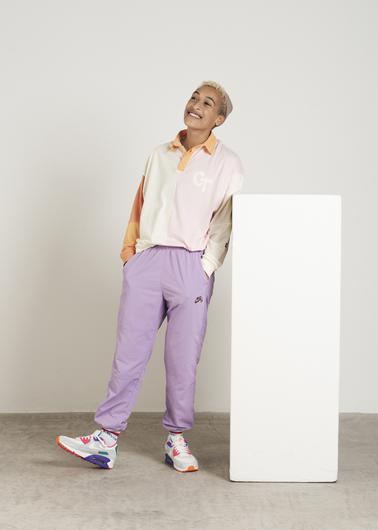Moving with the queer Irish diaspora from 1987 to the present day, Phillip McMahon’s Once Before I Go will draw comparisons to It’s A Sin, the Channel 4 series about a group of queer friends during the rise of HIV and Aids in 1980s London that aired earlier this year. It will draw comparisons, but by taking on the village-like mentality of Ireland and the hold that Catholicism has on heteronormativity here, it remains entirely and remarkably its own thing.
Set in Dublin, Paris and London, the play follows Lynn, Bernard, Jase and Daithí as they grow, learn and adapt to a changing world. Currently enjoying its world premiere run at Dublin’s Gate Theatre, Once Before I Go imagines the lives of queer people whose stories were censored or untold, while honouring those we’ve lost and those who never stopped fighting.
“It’s revolutionary when they’re fine,” says Matthew Malone, the Dublin actor who plays the bold and brassy Bernard, a recently out but joyously confident gay man.
Londoner Sam Crerar, the non-binary actor who plays Jase, a trans man awaiting corrective surgery, says: “I honestly had to stop watching films that had Black people in them because I’ve got this complex and I’m so worried that they are going to die.”
The question they’re both answering is what would their 15-year-old selves think if they saw characters like the ones that they’re playing on stage — because, no, they didn’t.
Honestly, how could they have? For the LGBTQ+ community and people of colour and other minority groups, representation has only recently started to accurately exist in film, theatre and television.
Before then, these characters either died tragically in the first scene or they were used as a tool for the hero — so often, a straight, white male — to save the day.
“I think it’s a great marker for progression; 20 or 30 years ago it was an absolute impossibility that something like this could be pulled out of the Gate Theatre,” says Desmond Eastwood, the Belfast actor who plays Daithí, a gay man who follows the rules until he learns to set his own. “This whole process has been a real education.”
McMahon, who co-founded the THISISPOPBABY production company and co-created the massively successful Riot, tells a story that moves with the times but holds great admiration for the queer activists of the past.
Video of the Day
This allows the audience to open the door to queer Irish history that was boarded up and padlocked for too long.
His play sees the characters watching the Aids crisis unfold at home and abroad. Whenever siblings Lynn and Bernard and their comrade-in-arms Daithí receive death notices for young friends, they find new ways to support and take pride in their community.
Cut out by their families, they establish their own, with Jase eventually joining the fold. With a rainbow coalition cast and crew of queers and allies, the play authentically reflects this ‘intersectionality’ while capturing the complex dynamics that exist within the community.
“There’s a real honesty about the perspectives in the sense that nothing is very rose-tinted in the play — because obviously so much of it so sad — but even the intercommunity relationships in it are strained at times because there’s a call-out on moments of slight ignorance,” explains Martha Breen, the Wicklow actor who plays Lynn, the furious activist who leaves for London so she can “lesbian without having to do it in the shadow of gay men”.
They examine their differences and their privileges through fiery arguments, with each character gleefully outsmarting the next.
“What’s authentic is they don’t agree with each other,” Malone quips. “It’s a bunch of queer people constantly disagreeing. And that feels true. That’s some Utopia where we’re all on one exact queer page.”
It’s important to remember how, in Ireland, homosexuality was only decriminalised in 1993 and same-sex marriage made legal by public vote in 2015.
Once Before I Go is largely set in 1987, just five years after the real-life killing of Declan Flynn in Dublin’s Fairview Park in a so-called ‘queer bashing’.
In this play, the gang celebrate the fact that gay men and lesbian women came together to form the National Gay Federation (NGF), something that had never really happened before.
Lynn and Daithí volunteer in the Hirschfeld Centre, the headquarters for the NGF where Flynn had volunteered. Among many other things, the centre was home to the friend-making phoneline Tel-A-Friend and Flikkers, the much-loved disco. Founded in 1979, the centre was burned to the ground in an arson attack in November 1987, becoming an emblem for the constant threat that Irish queerness was, and still is, under.
Today, these threats manifest in different forms, and the younger generation are aware of the work that came before them.
“What feels right about it is that we’re the ones having to talk about it; people who stand on the shoulders of all from that time,” Malone explains.
“So it’s a bunch of people in our 20s having to embody and honour and investigate that stuff.
“I’ve definitely spoken to so many older queer people and they’re so generous in talking about the time, but it does cost them in the way that it costs any of us to talk about past trauma.”
He mentions activist Tonie Walsh, the former president of the National LGBT Federation and founder of Gay Community News — Ireland’s longest running LGBTQ+ publication — and the Irish Queer Archive.
Coincidentally, the promotional photo for Once Before I Go was taken by Walsh and it features his then-boyfriend who was dressed as a gin and tonic at the Halloween Ball in the Hirschfeld Centre. It was taken just weeks before the fire.
“It costs him to have to be so generous with his time and his spirit and, effectively, sometimes his trauma,” Malone says. “So for that to be passed on to something healthier and less costly to the people that actually went through it feels right.”
“It’s a celebration as well,” Breen says thoughtfully. “There are obviously massive moments in the play that will cost the audience, no matter who they are, whether or not they experienced that time through the lens of the characters we’re playing.
“But at the same time it does feel like a massive testament to them as well, to their strength and humour. A lot of what we’re talking about is that dark humour that helps people survive.”
There is an overbearing sadness in this production but there’s also music. When another dear friend dies from HIV or violence, they grieve but then they dance together in Flikkers. If someone is sick, they cry but then they sing a show tune.
Through great care, consideration and eloquence from the writer, director and everyone involved in this play, it’s a story that feels like it is finally being told from the right perspective.
In a particularly moving scene, two characters discuss the possibility of same-sex marriage as if it were a fantasy. The cast recall how a member of the production team, who was part of the queer activist scene in the early 1990s, sat in with them as they rehearsed and said two men getting hitched in 1991 “would have been like a unicorn walking into the room”.
The contrasts between now and then are stark but it begs the question: what is today’s biggest challenge? The four actors share a resounding support for trans people, particularly trans women of colour.
The one-on-one fight for equality requires patience and Crerar has been using this approach since graduating from the London Academy of Performing Arts.
“I think that’s one of the beautiful parts about interpersonal activism. You learn each other’s boundaries and ways of communication so they can continue building,” Crerar explains carefully. “One of the brilliant things I found within my personal life is that when you are able to articulate yourself well and get your point across in a meaningful way, that allows the person that you’ve done that with to then do the same.
“When you give people access to the language that they can use to express ideas that they might not have found form to before. That can be really powerful.”
Dreaming of marriage equality, exploring the non-binary nature of gender and living to see the day where HIV could be untransmittable, Once Before I Go is a time-travelling tribute to the obstacles that have been overcome and a signpost for where we should be heading
next.
Once Before I Go runs at the Gate Theatre until October 30, 2021. See gatetheatre.ie








